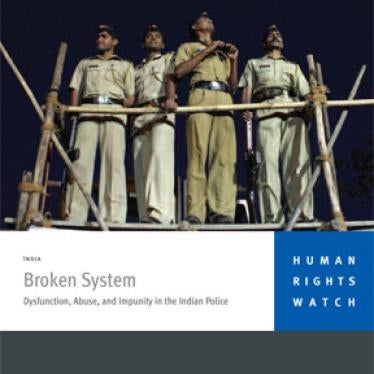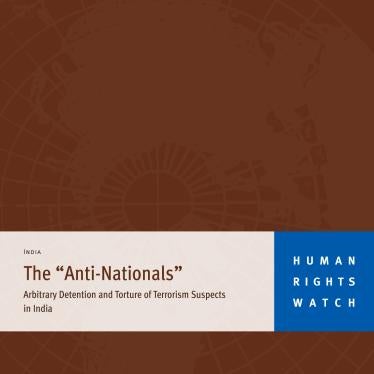(New Delhi) – The alleged mistreatment of a suspected Sikh separatist in Punjab highlights the widespread use of torture by Indian security forces, which may prevent foreign extraditions to India, Human Rights Watch said today. The Indian parliament should promptly enact the Prevention of Torture bill and the government should take immediate steps to implement its provisions, including ending all torture and ill-treatment by security forces and prosecuting those responsible.
Human Rights Watch called for an investigation into allegations that the Punjab police tortured Kulvir Singh Barapind after his September 20, 2012, arrest on charges of waging war on the state, possession of explosives, and sedition.His lawyer told Human Rights Watch that Barapind had complained to the magistrate that the police “applied electric shocks to his ears, beat him, and humiliated him.” The United States had extradited Barapind to India on June 17, 2006, on murder charges after obtaining assurances from India that he would not be tortured. A court in India subsequently acquitted Barapind of all charges and released him in April 2008.
“Indian authorities seldom deny that torture is a problem, but their failure to ensure the safety of someone in a high-profile international case shows how extensive it is,” said Meenakshi Ganguly, South Asia director at Human Rights Watch. “This case spotlights the urgency for India to enact the Prevention of Torture bill and put its provisions into immediate effect.”
Foreign governments need to take into account India’s poor record on torture in assessing whether to extradite individuals to the country, Human Rights Watch said. International law prevents governments from returning any person, including criminal suspects, to a country where they are likely to face torture or other ill-treatment. The Convention against Torture states that countries making such a determination “shall take into account all relevant considerations, including…the existence in the State concerned of a consistent pattern of gross, flagrant or mass violations of human rights.”
In June 2012 a court in Denmark stopped the extradition of Danish national Niels Holck, known as Kim Davy in India, who was sought by India for smuggling weapons to a militant group in West Bengal in 1995. The Danish government had accepted India’s request for extradition in 2010, but Danish courts eventually ruled that Holck said that he was at risk of torture and mistreatment in India.
During India’s Universal Periodic Review at the United Nations Human Rights Council in May 2012, several countries recommended that India enact legislation specifically prohibiting torture and ratify the Convention against Torture.
“Human rights groups have long documented the widespread use of torture to extract confessions, identify criminals, and often to simply punish suspects in custody by assuming their guilt,” Ganguly said. “But the recent UN review of India’s rights record made clear that governments are also deeply concerned about pervasive torture.”
In two reports, “Broken System,”documenting the urgent need for police reforms, and “The Anti-Nationals,”on violations during India’s counterterrorism operations, Human Rights Watch found evidence of widespread use of torture throughout India. Police admitted that without proper training and equipment to gather evidence, and under pressure to solve crimes, an overworked force frequently uses torture as the tool most readily available to them. Many admitted that coerced confessions and information also misled inquiries, allowing criminals to escape and innocent individuals to be arrested.
Human Rights Watch has also extensively documented allegations of torture in Punjab, Manipur, and Jammu and Kashmir, by both the army and police. Border residents in the Indo-Bangladesh border are also subjected to torture by the Border Security Force. In operations against Maoist insurgents, government forces, including the police and central government paramilitary, have engaged in arbitrary arrests and torture of ordinary villagers in an effort to extract information about insurgents hiding in the jungles. Security forces often use electric shock, crushing of limbs, pulling of fingernails, severe beatings, and threats of violence against family members to punish suspects and extract information.
Human Rights Watch called on the Indian government to ratify the Convention against Torture and Other Cruel, Inhuman or Degrading Treatment or Punishment, and to enact the Prevention of Torture bill, which is currently awaiting cabinet approval before it is voted on by the Rajya Sabha, the upper house of parliament. The law should override all provisions of Indian law that allow government officials immunity from prosecution for human rights violations. It should also ensure that adequate time is given for victims to be able to file complaints, and that all forms of inhuman and degrading treatment are brought under the purview of the law.
“Torture is routine in India’s police stations, but that practice is exacerbated in situations of conflict,” Ganguly said. “Barapind’s case gives the Indian government a high-profile reminder to take action against the chronic problem of torture in custody.”








